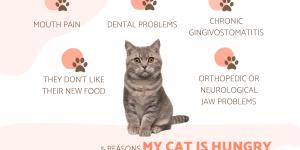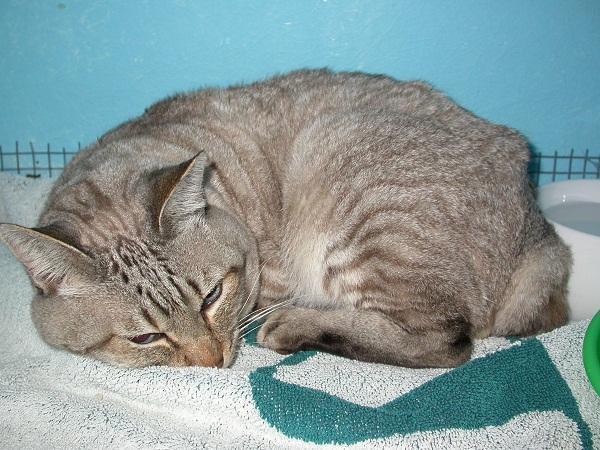Is My Cat Anorexic? - Anorexia in Cats



See files for Cats
In cats, anorexia is a nonspecific term symptom which can be associated with various medical conditions and pathologies. Similar to anorexia in humans, feline anorexia is a result of the cat not eating, resulting in significant weight loss. Anorexia will progressively weaken the cat with serious consequences to their body. When we first notice our cat starts to lose weight, we should take them to a veterinarian. They will be able to diagnose the problem and administer treatment.
Keep reading this AnimalWised article to find out more about anorexia in cats. If you are wondering is your cat anorexic?, we look at the underlying causes, symptoms and treatment so we can ensure the health of our cat.
What is anorexia in cats?
To know if your cat is anorexic, we need to know more about the condition itself. Anorexia is the term for the condition when an organism doesn't eat. It can be synonymous with a lack of appetite, since the cat will not eat. There are multiple reasons why a cat will not eat, ranging from physiological pathologies to psychological stress.
Generally, anorexia in cats occurs as an acute phase response which arises as a result of internal physiological changes. These can include infections, diseases, trauma, organ damage, tumors and others. We should differentiate anorexia the symptom with anorexia nervosa the eating disorder. Anorexia nervosa occurs as psychological condition associated with mental health. Cats do not suffer anorexia nervosa in the same way as human beings.
Causes of anorexia in cats
Anorexia in cats can occur as a result of many different medical conditions. Although it can happen at any stage of a cat's life, it is more common in older cats. This is due to age-related diseases which can have anorexia as a symptom. The most common causes of feline anorexia include:
- Oral diseases: painful diseases of the gums, teeth or soft tissues of the mouth can be due to infections, fractures, dental resorption, tumors or chronic gingivostomatitis. The resulting pain can make eating very difficult and the cat often choses not to eat rather than endure the discomfort. This can be exacerbated if they only have dry feed which can be too hard to chew comfortably.
- Food rejection: if you have abruptly changed the cat's food, it is possible they will reject the new one. If this happens, the cat will lose weight over time. It may not be that the cat won't like the new feed, but that the sudden change has caused them to reject it.
- Heat: a cat in heat will be very anxious and nervous. The heat period can make the cat very frustrated, so much so their only objective is to mate, eschewing even eating. Sterilization is recommended in cats for many reasons and preventing this happening is one of them.
- Stress or anxiety: cats are very sensitive to stress so even minimally stressful situations can lead to various consequences, including anorexia. Take a look at the reasons why cats are stressed to know more.
- Poisoning: if your feline ingests a toxic substance, such as an certain types of plant or unsuitable human food, they can suffer internal damage. The cat will be so ill that they will not want to eat. In fact, in some cases we will detect other clinical signs which require urgent treatment.

- Problems with smell: cats use their noses to breathe and to smell food. Any blockage can cause a loss of appetite, in addition to causing stress and discomfort.
- Infectious or parasitic disease: diseases weaken cats and have various symptoms. For example, feline rhinotracheitis causes rhinitis and nasal discharge that make them lose their sense of smell, eventually causing them to stop eating.
- Esophageal disease: esophagitis, gastroesophageal reflux or foreign bodies in the esophagus can be extremely annoying and painful for our cats.. They will also affect the ingestion of food, as these increase friction with the esophageal mucosa and can be very painful. Inflammation of the stomach or gastritis can also lead to anorexia.
- Pancreatic disease: pancreatitis or inflammation of the pancreas is a cause of abdominal pain in cats, although this discomfort is sometimes difficult to notice. Anorexia is one of the symptoms of this disease.
- Liver or biliary disease: diseases of the liver parenchyma or biliary tract can cause anorexia in cats, in addition to other signs associated with the process.
- Intestinal disease: intestinal conditions such as inflammatory bowel disease, enteritis, foreign bodies, or tumors can cause the cat to be unwell, listless and stop eating.
- Renal failure: the kidneys are involved in filtering the blood, so if they do not work properly, toxins accumulate and cats do not feel well, causing anorexia, among other symptoms.
Symptoms of anorexia in cats
As we have said, anorexia is not a disease, but a clinical sign resulting from multiple possible causes. If the underlying cause is not treated quickly, the anorexia can progress. When this occurs, the cat is not getting the nutrients they need to survive which causes various secondary symptoms. These can include poor coat appearance, dehydration, malnutrition, lethargy, weakness, muscle atrophy and more.
If we want to know is our cat anorexic, we need to know if they have something causing anorexia. For this reason, we show you some other specific symptoms of feleine diseases which lead to anorexia:
- Kidney disease: polyuria-polydipsia syndrome can be observed, i.e. the cat urinates and drinks more than normal.
- Hepatobiliary disease: it is possible to see jaundice, which is the yellowing of the mucous membranes, lethargy or swelling of the abdomen due to the abnormal accumulation of fluids.
- Pancreatitis: abdominal pain, dehydration and weakness are common with pancreatic inflammation.
- Inflammatory bowel disease: as with other bowel disorders, you can see digestive symptoms such as diarrhea, vomiting, malabsorption or electrolyte imbalances.
- Esophageal and gastric disorders: these can cause vomiting, regurgitation, hypersalivation, coughing, fever and extended head and neck posture when swallowing. This last symptom is due to odynophagia, which is pain when swallowing.
Diagnosis of anorexia in cats
Anorexia in cats is relatively easy for caregivers to diagnose. In principle, we can see it when the cat eats very little or no food at all. However, the underlying cause which has anorexia as a symptom is much more difficult to discern. This is partly because there are so many possible reasons for their appetite loss.
For diagnosis of the underlying cause, we must take the cat to a veterinarian. Only they can accurately diagnose the condition. They will do so by performing some combination of the following tests:
- Physical examination
- Anamnesis (medical history)
- Blood tests
- X-ray
- Ultrasound
- Cytology
- Biopsy
Anorexia doesn't always mean a cat will not eat at all. Take a look at our article on why my cat only eats a little at a time to know more.

Treatment of feline anorexia
Once anorexia is diagnosed, treatment must begin immediately to avoid the advance of negative effects. Haste is especially important in young kittens, due to their vulnerability. They have low energy reserves, but a high energy demand and their immune system is still developing.
Overweight and obese cats are also at higher risk, as they have a higher risk of developing liver lipidosis. Hepatic lipidosis is a liver disorder that involves the accumulation of fat vacuoles in liver cells. It is also known as fatty liver disease in cats and can have serious consequences, even death.
Due to dehydration, anorexic cats may need to be hydrated as soon as possible through fluid therapy. It may be necessary to force feed the cat through feeding tubes to prevent complications. Once these immediate problems are addressed, the underlying cause will need to be treated.

If you want to read similar articles to Is My Cat Anorexic? - Anorexia in Cats, we recommend you visit our Diet problems category.
Atencia, S. (2020). Clinical diagnosis of gastrointestinal, liver and pancreatic diseases of the cat. Improve International.
Martínez-Subiela, Tecles, Parra and Cerón. Acute phase proteins: Basic concepts and main clinical applications in veterinary medicine. University of Murcia.







